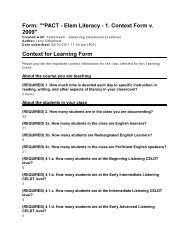The Tutoring Book - California State University, Sacramento
The Tutoring Book - California State University, Sacramento
The Tutoring Book - California State University, Sacramento
You also want an ePaper? Increase the reach of your titles
YUMPU automatically turns print PDFs into web optimized ePapers that Google loves.
Know When to Hold ‘Em, Know When to Direct ‘Em<br />
44<br />
Brett Perkins<br />
Spring 2011<br />
When you tutor in the writing center, you will encounter a variety of tutoring situations and a<br />
diverse array of students. You might tutor a student with a learning disability, or a second language<br />
learner, or a drop-in, or a frustrated student, or, instead, a student that frustrates you. Through each<br />
tutoring session, your most effective tool is something intangible. That is, it cannot be touched or grasped,<br />
like a hammer, but a tool it is, nevertheless. Each time you tutor, but especially when you begin, if you<br />
have this intangible tool at your disposal, you will be prepared and equipped to tutor any tutee.<br />
<strong>The</strong> readings you analyze in class coincide with your tutoring. <strong>The</strong>y better prepare you, and<br />
theorize the act of tutoring. You will read about tutoring in a non-directive manner, that it’s the only<br />
acceptable way to collaborate with a student, or instead that you need to be more directive with students if<br />
the situation calls for it, or to only address higher order concerns, and so on and so forth, until, at some<br />
point, it may seem as if these arguments can't quite keep up with what you learn from first hand<br />
experience. When you reach this point, the advice you read is not obsolete, but rather the knowledge<br />
you've gained through tutee/tutor interaction relegates the readings as more supplemental than primary, in<br />
your development. What I mean is, the optimum way to learn as a tutor is to be attentive to the student<br />
and adapt your approach to suit their needs. <strong>The</strong> tool/intangible I've found to be most effective, not only<br />
through personal experience, but also from listening to other tutors, is attentiveness. This particular tool<br />
will serve you in the beginning, through the middle, and to the end of your tutoring experience. It are<br />
always helpful and necessary in understanding each student you tutor, and will aid you in the acquisition<br />
and development of other tools.<br />
What if you sit down with a student and they say, "I just need you to look over my paper for<br />
grammar." You should know, that's not what the writing center is for, lower order concerns. But what if<br />
addressing the lower order concerns can help the student to work on higher order concerns, as well?<br />
Being attentive, or reading your student, will allow you to decide whether you need to adhere to the letter<br />
of the law or if you should use the student's request for grammatical assistance as gateway to facilitate<br />
their growth as a writer.<br />
Reading a student is like playing poker. In poker, your opponent doesn't know what cards you<br />
have and you don't know what cards they have. In order to win, it is not always necessary to hold the best<br />
hand. Often times, being able to read body language, being aware of a player's tendencies, and trusting<br />
what’s learned from previous experience can give one a significant advantage. You won't always utilize<br />
what you observe, or notice as much each time, but being able to not only play your own cards (work with<br />
an essay), but also read the player (understand your tutee) gives you more to work with, and thus<br />
increases the chances of success.<br />
If a student is having a bad day, frustrated with their teacher, or just shy, your ability to read each<br />
student will help you help them and improve your effectiveness as a tutor. A fellow tutor told me a story<br />
about a student she tutored regularly, throughout the semester. As the semester neared the end, the<br />
student had to prepare a presentation for a class. <strong>The</strong>y worked together to assess what the student had<br />
already put together. Her information was organized and thorough, the tutee merely lacked the confidence<br />
to present it articulately. <strong>The</strong> tutor told me how she simply pointed out observations to the student and<br />
reminded the tutee (Melissa) that Melissa was the authority on the information she compiled. Melissa<br />
wondered if her information seemed accurate and the tutor pointed out specific parts of Melissa's<br />
presentation and why she thought Melissa knew exactly what she was doing. All the student really need

















